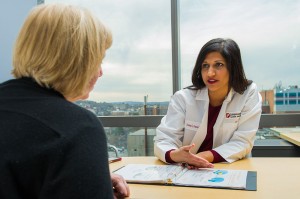Although most cancers are sporadic or occur by chance, a small percentage are due to inherited genetic (or germline) mutations, which can often be identified through genetic testing.
 These mutations are different from somatic mutations, which are not inherited, but occur during one’s lifetime. Profile, a research project launched by Dana-Farber and Brigham and Women’s Hospital, has been analyzing DNA from tumor tissue since 2011 to learn more about how somatic mutations drive cancer.
These mutations are different from somatic mutations, which are not inherited, but occur during one’s lifetime. Profile, a research project launched by Dana-Farber and Brigham and Women’s Hospital, has been analyzing DNA from tumor tissue since 2011 to learn more about how somatic mutations drive cancer.
“Depending on family and personal history, we can test for genes that confer an increased risk for developing cancer,” says Huma Q. Rana, MD, clinical director for Dana-Farber’s Center for Cancer Genetics and Prevention. “We can then assess a patient’s cancer risk based upon the results and form a plan to monitor for cancer or reduce the risk of developing cancer.”
Here are five facts you should know about cancer genetics:
1) Who should get a genetic test?
At this time, genetic testing isn’t for everyone. “Genetic susceptibility to cancer is not that common within the total population,” Rana says.
People who should consider genetic testing include those with a strong personal or family history of cancer. Clues to a genetic predisposition for cancer include: young age at cancer diagnosis, multiple cancers in one person, the development of rare or unusual cancers, and the presence of related cancers in a family over generations. Testing is recommended for people who have a known genetic mutation in their family for which they are at risk.
2) What does a genetic test entail?
Genetic testing is not as scary as it may sound. People undergoing testing meet with a genetic counselor and often a physician to review their family history (see below) and provide consent. Testing is performed on a blood or saliva sample which is sent to a lab that specializes in genetics. The results are returned to the physician and genetic counselor, who will discuss them with you and arrange appropriate follow-up care.
3) What is a genetic counselor?
Genetic counselors are trained, licensed professionals who help educate patients about inherited cancer syndromes and help interpret confusing or uncertain genetic test results. The counselors also help individuals gather family history, discuss options for risk management and family planning and provide, or refer individuals, for psychosocial support as needed.
4) What steps do you have to take before getting a genetic test?
Before getting a genetic test, you will sit down with a genetic counselor and physician who will help determine the likelihood of an underlying cancer predisposition. Information regarding your and your immediate family’s specific cancer(s), age(s) at diagnosis, or information about pre-cancerous conditions such as colon polyps should be brought to this meeting as well as copies of personal or family genetic test results. If possible, you should also collect other medical records such as pathology reports, surgical reports, or summary notes.
5) What does a positive genetic test mean?
A positive genetic test does not equal a cancer diagnosis.
“A positive test does not mean you have cancer or that you will necessarily develop it, but rather that your chances of developing it are higher than that of the average person,” Rana explains.
If you have a mutation that can cause cancer, you will work with a genetic counselor and physician to create a management plan. This plan informs you of what could happen, and helps outline screenings or other options to prevent cancer from developing.
For more information on genetic testing, contact the Center for Cancer Genetics and Prevention at the Dana-Farber/ Brigham and Women’s Cancer Center, or check out the live webchat with Rana on Wednesday, July 16 at 1 p.m.
You can also submit questions about genetics and cancer to Ask the Cancer Genetics Team. An answer to your question may appear on the Dana-Farber website and will be sent to you via email.
